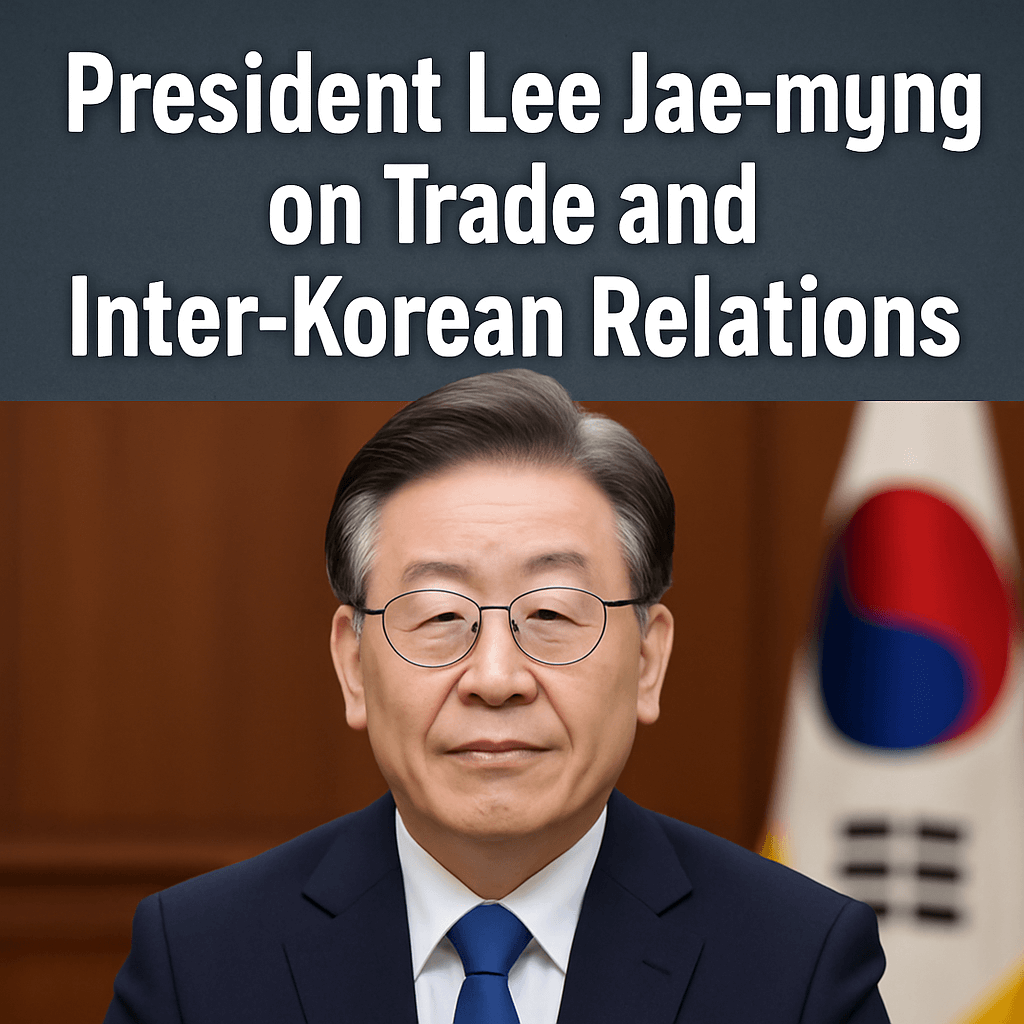President Lee Jae-myung on Trade and Inter-Korean Relations

South Korea’s newly inaugurated President, Lee Jae-myung, took office with a commitment to strengthen ties with North Korea and address significant global economic challenges. Speaking shortly after the certification of the election results on Wednesday, he emphasized the importance of dialogue and cooperation amidst rising geopolitical tensions and economic uncertainty.
Election Overview
Lee, a member of the center-left Democratic Party, won a significant victory in the snap election with 49.4% of the vote compared to his conservative opponent, Kim Moon-soo, who garnered 41.2%. Kim’s campaign was hampered by party infighting and a split in the right-wing vote due to a third-party candidate.
Lee’s pledge to bridge the divisive gap with North Korea, a nation whose regime is under significant scrutiny for its military provocations and nuclear arsenal, marks a notable shift in South Korea’s traditional approach. Unlike his predecessor, who adopted a more hardline stance, Lee intends to pursue a strategy of engagement without imposing preconditions on dialogue with Pyongyang.
Global Economic Context: A Looming Threat of Protectionism
In his inaugural address, Lee highlighted the global rise in protectionism and supply chain disruptions as an “existential threat” to South Korea’s export-driven economy, which is the fourth largest in Asia. He pointed to U.S. tariffs on steel and aluminum, set to take effect just hours after his inauguration, as particularly impactful on sectors crucial to South Korean economic output. The 50% tariffs will significantly increase costs for local manufacturers who rely on these materials for the automotive and electronics industries.
“The rapid changes in the global order, such as rising protectionism and supply chain restructuring, pose a threat to our very survival,” Lee noted. This warning comes on the heels of an increasingly fragmented global trading environment as countries implement measures aimed at protecting their domestic industries, often at the expense of international cooperation.
Strategic Military Reassurances
In tandem with economic strategies, Lee took command of the country’s armed forces, underlining the need for preparedness against North Korean provocations. He affirmed the need to establish operational readiness while maintaining open lines of communication. “We will deter North Korean nuclear and military provocations while opening communication channels and pursuing dialogue and cooperation to build peace on the Korean Peninsula,” Lee asserted.
Analysts have noted that this posture reflects an essential balance between deterrence and diplomacy, crucial for maintaining regional stability. Hong Min, a senior analyst at the Korea Institute for National Unification, remarked that this approach signals a willingness to engage in dialogue, given that it deviates significantly from the precondition-laden strategy of the prior administration.
International Relations and Economic Policy
Lee’s administration is expected to focus on enhancing alliances with key global players. Following his election, he received congratulatory messages from several world leaders, including U.S. President Joe Biden, Chinese President Xi Jinping, and Indian Prime Minister Narendra Modi, all of whom expressed hope for productive cooperation.
Biden emphasized the “ironclad” alliance between the U.S. and South Korea, building upon shared values and economic ties. Conversely, Xi expressed a desire to strengthen the bilateral relationship, proposing a framework for mutual benefits between the two nations. These interactions signal a promising start for Lee’s administration in navigating complex international relations, particularly amid concerns about Chinese influence in regional affairs.
Political Landscape and Legislative Challenges
With the Democratic Party holding a parliamentary majority, President Lee is positioned to advance his legislative agenda efficiently. Early appointments, including Kim Min-seok as prime minister and Lee Jong-seok as the spy chief, indicate a strategic consolidation of leadership aligned with his policy vision.
Public sentiment in South Korea appears cautiously optimistic regarding Lee’s overtures to North Korea. Many citizens expressed hope that Lee’s presidency could facilitate long-term stability and economic prosperity through better inter-Korean relations, acknowledging the interconnectedness of national security and economic health.
Conclusion
In summary, President Lee Jae-myung’s inaugural address framed a dual focus on healing division on the Korean Peninsula and addressing the looming challenges posed by protectionism in the global landscape. As he embarks on his term equipped with a legislative majority, the international community and South Koreans alike will be closely observing his approach to securing both diplomatic and economic stability.
According to Lee, ‘No matter how costly, peace is better than war’—a sentiment that now shapes South Korea’s strategic outlook towards the North.
Source: fortune